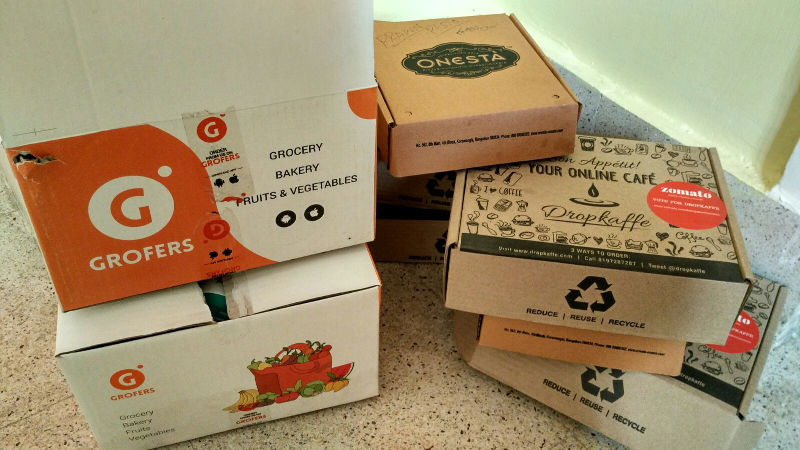- Home
- Apps
- Apps Opinion
- India's Hyperlocal Delivery Startups Have a Problem No One's Talking About
India's Hyperlocal Delivery Startups Have a Problem No One's Talking About

Last week, a friend of mine ordered me a dal chawal dinner from Mast Kalandar, a Bengaluru-based food tech startup that prepares and delivers "home cooked" meals. Unlike most restaurants which serve food in plastic bags or boxes, this one came in a plastic tray with a plastic lid glued on top. The packaging felt like it was made by a UX torturer from hell - it took both my hands and good measure of finesse, patience, and resolve, to pull the plastic off the tray without spilling the contents that were filled to the edges of the tray. While the contents were appetising, the packaging filled me with the resolve to look at other food delivery options henceforth. That single meal of mine had enough plastic in it to choke a cow.
Plastic packaging is ubiquitous in the doorstep food delivery sector, across all the price points, from budget to gourmet food. None of the restaurants I've come across see any value in being environmentally and socially responsible for the plastic and packaging they bring into the household with every delivery.
Food tech startups are only further aggravating this problem, because thanks to the promise of "healthy home food", not to mention deals, they're driving an ever growing number of deliveries. And each delivery comes with its layers and layers of plastic, that far outstrips anything restaurants do.
These startups don't have to use disposable containers - all it takes is a cheap, low tech solution like a lunch box or a bento box, which can be washed and recycled for years. It needs to be a default option considering the scale and seriousness of the problem. Some tiffin delivery services pack food in disposable polythene bags, with scant regard for consumer safety or preferences. I'm sure they can budget it in, or make consumers pay a deposit for it, but as of now, nobody seems to be even thinking about this problem.
Outsourcing our food needs to a third-party has some obvious consequences at the end of the product lifecycle. At a morning ride down the low-income neighbourhoods in Ejipura, in Bengaluru, you will see the infernal hellscape that is the end result of thousands of working class people who didn't have the time to cook for themselves. Huge piles of polythene plastic lay around, burning slowly, diffusing dioxins into the air. These plastic bags also choke gutters during rains and cause flooding. It's a social problem most of our Indian readers have come across, and I for one can't wait for our ban-happy overlords to do something about it.
I now have a small collection of poly bags and cardboard boxes heaped in a corner of my kitchen thanks largely to Grofers, the hyperlocal delivery startup I have trusted to do my food shopping on a number of occasions over the last month. Dropkaffe, the Bengaluru-based online coffee and snacks on-demand service, delivers its sandwiches in cardboard boxes, which seem wholly unnecessary, since their sandwiches are already packed in saran wrap. I do give them credit for bringing my filter coffee in a flask, and pouring it straight into my mug.
Most startups are modeled around habit formation, consumer convenience and delight - but when it comes to food, I'm not sure if outsourcing this part of my life on a full-time basis is a good idea. In this RSA talk, Michael Pollan, author of the Omnivore's Dilemma talks about how cooking food at home has more health benefits, and shares sordid details on the fast food supply chain. You can see this talk below:
It will certainly make you want to take home cooking lessons, ask more questions about where your produce came from, or hire your own personal chef, instead of using one more app to place an order for a kilo of plastic, with some vegetables (cooked or otherwise) thrown in.
Catch the latest from the Consumer Electronics Show on Gadgets 360, at our CES 2026 hub.
Related Stories
- Samsung Galaxy Unpacked 2025
- ChatGPT
- Redmi Note 14 Pro+
- iPhone 16
- Apple Vision Pro
- Oneplus 12
- OnePlus Nord CE 3 Lite 5G
- iPhone 13
- Xiaomi 14 Pro
- Oppo Find N3
- Tecno Spark Go (2023)
- Realme V30
- Best Phones Under 25000
- Samsung Galaxy S24 Series
- Cryptocurrency
- iQoo 12
- Samsung Galaxy S24 Ultra
- Giottus
- Samsung Galaxy Z Flip 5
- Apple 'Scary Fast'
- Housefull 5
- GoPro Hero 12 Black Review
- Invincible Season 2
- JioGlass
- HD Ready TV
- Laptop Under 50000
- Smartwatch Under 10000
- Latest Mobile Phones
- Compare Phones
- Samsung Galaxy A07 5G
- Vivo Y500i
- OnePlus Turbo 6V
- OnePlus Turbo 6
- Itel Zeno 20 Max
- OPPO Reno 15 Pro Mini 5G
- Poco M8 Pro 5G
- Motorola Signature
- Lenovo Yoga Slim 7x (2025)
- Lenovo Yoga Slim 7a
- Realme Pad 3
- OPPO Pad Air 5
- NoiseFit Pro 6R
- Xiaomi Watch 5
- Acerpure Nitro Z Series 100-inch QLED TV
- Samsung 43 Inch LED Ultra HD (4K) Smart TV (UA43UE81AFULXL)
- Asus ROG Ally
- Nintendo Switch Lite
- Haier 1.6 Ton 5 Star Inverter Split AC (HSU19G-MZAID5BN-INV)
- Haier 1.6 Ton 5 Star Inverter Split AC (HSU19G-MZAIM5BN-INV)

















